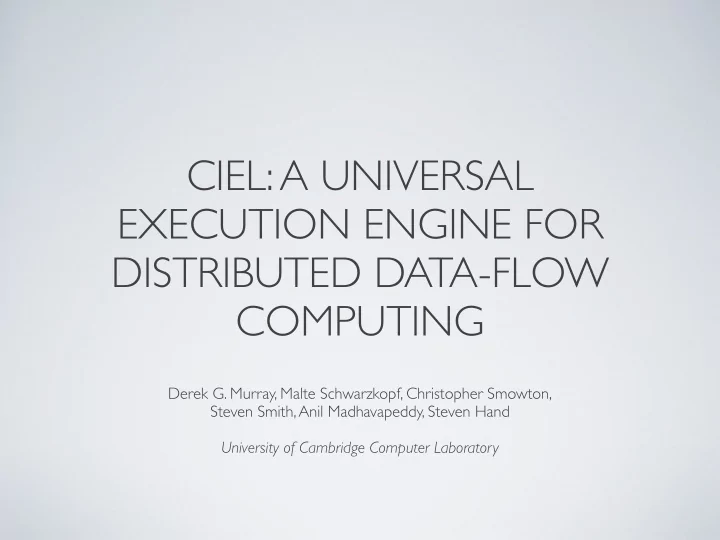

CIEL: A UNIVERSAL EXECUTION ENGINE FOR DISTRIBUTED DATA-FLOW COMPUTING Derek G. Murray, Malte Schwarzkopf, Christopher Smowton, Steven Smith, Anil Madhavapeddy, Steven Hand University of Cambridge Computer Laboratory
INTRODUCTION • Background Influences • What is CIEL? • Features • Skywriting • Evaluation • Conclusions
BACKGROUND INFLUENCES • Map-Reduce/Hadoop • Dryad • Pregel • Piccolo
WHAT IS CIEL? • Universal data-centric distributed execution engine • Designed for large dataset, coarse-grained parallelism • Based on data-dependent dynamic control flow • Uses 3 primitives - objects, references and tasks • Primary Goal is to produce object output
FEATURES • Dynamic task graphs • System architecture • Deterministic naming & Memoisation • Fault tolerance • Streaming
DYNAMIC TASK GRAPHS Objects • Unstructured finite-length sequence of bytes • Unique name • Immutable when written
DYNAMIC TASK GRAPHS References • Comprises name and set of locations where object is stored • Can be a future reference to object yet produced
DYNAMIC TASK GRAPHS Tasks Non-blocking atomic computation • Has one or more dependencies - represented as references • Includes special object that specifies the behaviour of the task • Two externally-observable behaviours - publish objects and spawn new tasks •
DYNAMIC TASK GRAPHS Object Evaluation • Role = evaluate one or more objects corresponding to job outputs • Job can be specified as single root task with only concrete dependencies • Two natural strategies - Eager and Lazy evaluation
FEATURES • Dynamic task graphs • System architecture • Deterministic naming & Memoisation • Fault tolerance • Streaming
SYSTEM ARCHITECTURE • Single master coordinating end-to-end execution of jobs • Several workers are used for execution of individual tasks • DTG maintained by master in object and task table • Master Scheduler (multiple queue based) responsible for making progress in CIEL computation • Executor = generic component that prepares input data for consumption
FEATURES • Dynamic task graphs • System architecture • Deterministic naming & Memoisation • Fault tolerance • Streaming
FEATURES • Dynamic task graphs • System architecture • Deterministic naming & Memoisation • Fault tolerance • Streaming
FEATURES • Dynamic task graphs • System architecture • Deterministic naming & Memoisation • Fault tolerance • Streaming
SKYWRITING • Key Features - ref, spawn, exec., spawn.exec, the dereference operator • Tasks - key feature = ability to spawn new tasks in the middle of jobs • Data-dependent control flow
EVALUATION • Grep • k- means • Smith-Waterman • Binomial options pricing • Fault-tolerance
CONCLUSIONS • Superset of features of existing distributed engines • Skywriting • Flexibility - Supports MapReduce job or Dryad graph • System-wide fault tolerance • Streaming • Memoisation
THANKS • Any Questions?
Recommend
More recommend